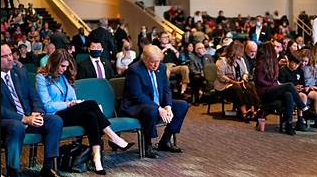Conservative Christians would use their unlikely champion’s return to office to impose their own regressive values on America.
At first glance, Donald Trump’s rise to the leadership of the Republican Party seemed to signal a decline in the influence of the American religious right. Trump’s history—his legal troubles, sexual misconduct allegations, and his widely criticized behavior—seemed to place him at odds with the values traditionally upheld by evangelical Christians. His business career is marred by unpaid debts and accusations of deceit, and he has been known to mock adversaries in ways that contradict the moral stance often associated with religious leaders.
Trump is far from the ideal figure that one might expect evangelical Christians to rally behind. His vulgarity and disregard for traditional values could not be more at odds with the image of the wholesome, family-oriented Christian values that conservatives claim to uphold. Yet, despite his many flaws, Trump has managed to win the unwavering support of evangelical voters, largely because of his willingness to champion their causes and his promise to reshape American society according to their values.
Through Trump’s presidency, conservative Christians are on the cusp of unprecedented political power. They see his return to office as an opportunity to push for a return to traditional Christian values, imposing their conservative religious beliefs on the nation. They hope to use Trump’s political influence to roll back progressive policies, particularly those related to women’s rights, LGBTQ+ rights, and secularism, all while solidifying the place of evangelical Christianity in American political life.
Trump’s base of evangelical support, though paradoxical, highlights a deep shift in the role religion plays in American politics. Rather than rejecting his personal flaws, these conservative Christians seem willing to overlook his immoral behavior, focusing instead on the opportunity his presidency provides to further their ideological goals. For them, Trump is not just a flawed man but a means to an end, a vehicle to impose their vision of a religiously guided America.
In this way, the alliance between Trump and evangelical Christians represents a dangerous pact: while Trump’s personal qualities are hardly in line with the values he’s asked to uphold, the political gains for conservative Christians are too great to pass up. If Trump returns to power, the country may face an intensified push to rewrite laws and policies based on evangelical Christian ideology. This would be a major turning point in American politics, as religious groups increasingly influence the direction of national policy in ways that reflect their own regressive values.

